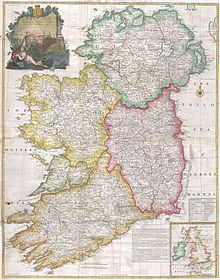This is an old revision of this page, as edited by Textorus (talk | contribs) at 03:41, 18 April 2022 (add paragraph breaks for ease of reading; also add 1 external link). The present address (URL) is a permanent link to this revision, which may differ significantly from the current revision.
Revision as of 03:41, 18 April 2022 by Textorus (talk | contribs) (add paragraph breaks for ease of reading; also add 1 external link)(diff) ← Previous revision | Latest revision (diff) | Newer revision → (diff)
| This article does not cite any sources. Please help improve this article by adding citations to reliable sources. Unsourced material may be challenged and removed. Find sources: "Constitution of 1782" – news · newspapers · books · scholar · JSTOR (April 2008) (Learn how and when to remove this message) |


The Constitution of 1782 is the series of legal changes which freed the Parliament of Ireland, a parliament established by and subordinate to the Crown of England, of legal restrictions that had been imposed by successive Norman, English, and later, British governments on the scope of its jurisdiction. The Irish parliament during this period is referred to as Grattan's Parliament.
Under the terms of Poynings' Law of 1495, no law could be passed that was not first approved by the Parliament of England: "An Act that no Parliament be holden in this Land until the Acts be certified into England". The parliament was established by and subordinate to the Crown of England. Along with other restrictions, it meant in effect, that the Lord Lieutenant of Ireland had control over the parliamentary agenda and authority to restrict its ability to legislate contrary to the objectives of the British government in London.
From 1782, Grattan — the leader of the Patriot Party — led a series of legal changes which produced a period of novel legislative freedom. The main act was the Repeal of Act for Securing Dependence of Ireland Act 1782. This act repealed the Declaratory Act of 1719. The 1719 Act had declared that the Parliament of Ireland was dependent on the Parliament of Great Britain and the Privy Council of Great Britain.
The British Rockingham Ministry had conceded the act in fear of an American-style revolt. This concession was followed by the Irish Appeals Act 1783, commonly known as the Renunciation Act. By the terms of this act, the Parliament of Great Britain renounced all right to legislate for Ireland, and declared that no appeal from the decision of any court in Ireland could be heard in any court in Great Britain.
Grattan's Parliament also achieved greater control over the Royal Irish Army.
The new constitutional arrangements proved short-lived in consequence of the 1798 uprising by the United Irishmen. By the Acts of Union the Parliament of Ireland was abolished. The Kingdom of Ireland was absorbed into the new United Kingdom of Great Britain and Ireland, with effect from 1 January 1801.
See also
External links
- "The Constitution of 1782" in Bartlett, Thomas. Ireland: A History. Cambridge: Cambridge University Press, 2010. ISBN 9780521197205
| Major constitutional laws affecting Ireland | |
|---|---|
| Pre-Union |
|
| UK Acts |
|
| Constitutions |
|
| Oireachtas Acts |
|
| Treaties |
|